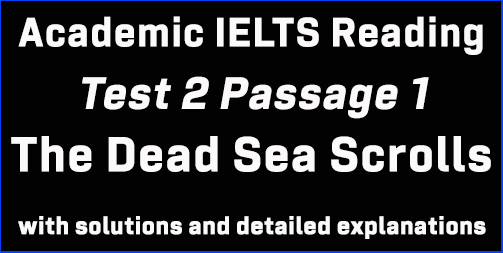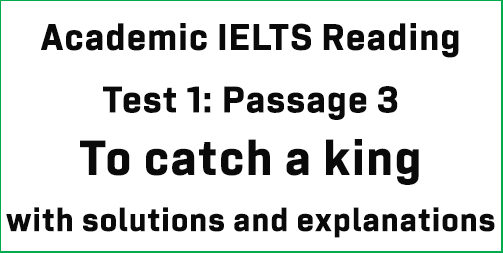IELTS Academic Reading: Cambridge 14, Test 4: Reading Passage 2; Why zoos are good; with best solutions and detailed explanations
This IELTS Reading post focuses on all the solutions for IELTS Cambridge 14 Test 4 Reading Passage 2 which is entitled ‘Why zoos are good’. This is an aimed post for candidates who have major problems in finding Reading Answers. This post can guide you the best to comprehend every Reading answer without much difficulty. Tracing IELTS Reading answers is a slow process and I sincerely hope this post can assist you in your IELTS Reading preparation.
IELTS Cambridge 14 Test 4: AC Reading Module
Reading Passage 2:
The headline of the passage: Why zoos are good
Questions 14-17 (Identifying information):
[This question asks you to find information from the passage and write the number of the paragraph (A, B, C or D … .. ) in the answer sheet. Now, if the question is given in the very first part of the question set, I’d request you not to answer them. It’s mainly because this question will not follow any sequence, and so it will surely kill your time. Rather, you should answer all the other questions first. And just like List of Headings, only read the first two lines or last two lines of the expected paragraph initially. If you find the answers, you need not read the middle part. If you don’t find answers yet, you can skim the middle part of the paragraph. Keywords will be a useful matter here.]
Question 14: a reference to how quickly animal species can die out
Keywords for this question: quickly, animal species, die out
The first few lines of paragraph B give us the answer, “Colossal numbers of species are becoming extinct across the world, and many more are increasingly threatened and therefore risk extinction. Moreover, some of these collapses have been sudden, dramatic and unexpected.”
So, the answer is: B
Question 15: reasons why it is preferable to study animals in captivity rather than in the wild
Keywords for this question: preferable, study animals, captivity, rather than, wild,
Again, lines 3-4 of paragraph E give us the answer to this question. The author says, “Being able to undertake research on animals in zoos where there is less risk and fewer variables means real changes can be effected on wild populations.”
Here, there is less risk and fewer variables = reasons why it is preferable
So, the answer is: E
Question 16: mention of two ways of learning about animals other than visiting them in zoos
Keywords for this question: two ways of learning, animals, other than visiting zoo,
The answer can be found in paragraph C. In lines 2-3, we find the first way, “… .. television documentaries are becoming ever more detailed and impressive,. .” whereas lines 3-4 give us the second way, “ . . .and many natural history specimens are on display in museums, . .. . .”
So, the two ways are television documentaries and natural history specimens.
So, the answer is: C
Question 17: reasons why animals in zoos may be healthier than those in the wild
Keywords for this question: animals in zoos, may be, healthier,
In paragraph A, lines 3-4 indicate us the answer to this question. “ . .. Animals in good zoos get a varied and high-quality diet with all the supplements required, and any illnesses they might have will be treated.”
So, the reasons are getting healthy diet and good treatment.
So, the answer is: A
Questions 18-22: In this type of question, candidates are asked to find out whether:
The statement in the question agrees with the information in the passage – TRUE
The statement in the question contradicts the information in the passage – FALSE
If there is no information on this – NOT GIVEN
[For this type of question, you can divide each statement into three independent pieces and make your way through with the answer.]
Question 18: An animal is likely to live longer in a zoo than in the wild.
Keywords for this question: likely to, live longer, zoo, than in the wild,
The first lines of paragraph A says, “…. it is perfectly possible for many species of animals living in zoos or wildlife parks to have a quality of life as high as, or higher than, in the wild.”
Here, a quality of life .. . . . higher than, in the wild = likely to live longer
So, the answer is: TRUE
Question 19: There are some species in zoos which can no longer be found in the wild.
Keywords for this question: some species, zoos, no longer be found, wild,
In paragraph B, look at line 6, “A good number of species only exist in captivity, . . .. .”
Here, only exist in captivity means that the animals cannot be found in the wild any more.
So, the answer is: TRUE
Question 20: Improvements in the quality of TV wildlife documentaries have resulted in increased numbers of zoo visitors.
Keywords for this question: improvements, quality of TV wildlife documentaries, resulted, increased, zoo visitors,
We find the mention of ‘TV wildlife documentaries’ in paragraph C in lines 2-3, “While it is true that television documentaries are becoming ever more detailed and impressive, . .. ..” But we do not find any statement about the results of TV documentaries.
So, the answer is: NOT GIVEN
Question 21: Zoos have always excelled at transmitting information about animals to the public.
Keywords for this question: zoos, always excelled, transmitting information, about animals,
In paragraph D, in lines 1-3, the author mentions, “. . ..there is also the education that can take place in zoos through signs, talks and presentations which directly communicate information to visitors about the animals they are seeing and their place in the world. This was an area where zoos used to be lacking. .. ”
The lines suggest that zoos have played a major part in transmitting information through signs, talks and presentations. But zoos had a lacking in it before. So, zoos did not always excel at transmitting information.
So, the answer is: FALSE
Question 22: Studying animals in zoos is less stressful for the animals than studying them in the wild.
Keywords for this question: studying animals, in zoos, less stressful, than studying, the wild,
Paragraph E talks about the role of zoos in research. But we do not find any information regarding stress in studying animals in the zoos or in the wild.
So, the answer is: NOT GIVEN
Questions 23-26: (Choosing the TWO best answers)
[In this type of question, candidates are asked TWO best possible answers for one question. Candidates need to write the correct LETTERS for the answers. Here, the techniques for Multiple Choice Questions are applicable.]
Question 23 & 24: Which TWO of the following are stated about zoo staff in the text?
Keywords for these questions: TWO, zoo staff,
In paragraph D, take a look at lines 5-7 carefully. “… .. Many zoos also work directly to educate conservation workers in other countries, or send their animal keepers abroad to contribute their knowledge and skills to those working in zoos and reserves, .. .. .”
Here, to educate conservation workers = teach people, send their animal keepers abroad = travel to overseas locations,
So, the answers are:
B (Some travel to overseas locations to join teams in zoos.)
D (Some teach people who are involved with conservation projects.)
Question 25 & 26: Which TWO of these beliefs about zoos does the writer mention in the text?
Keywords for these questions: TWO, beliefs,
The answer lies in lines 3-6 of paragraph F. Here, the writer says, “. . .They are vital not just in terms of protecting animals, but as a means of learning about them to aid those still in the wild, as well as educating and informing the general population about these animals and their world so that they can assist or at least accept the need to be more environmentally conscious.”
Here, protecting animals =raise animals which can later be released into the wild, more environmentally conscious = public awareness,
Other options talk about children overcoming their fear (A), employment opportunities (C) and income generation (D), which cannot be found.
So, the answers are:
B (They can increase public awareness of environmental issues.)
E (They can raise animals which can later be released into the wild.)
Click here for solutions to Cambridge 14 Test 4 Reading Passage 1
Click here for solutions to Cambridge 14 Test 4 Reading Passage 3




Question No. 20 is to be rectified as resulted, but you have stated insulted which gives a totall different meaning.
Thanks a lot Chamil, I’ve made the necessary rectifications. Thanks for the observation.
N.22 there is written information about zoo and few risk for wild animals , However the answer is n.g ???? Could you explain me please.
But there’s no mentioning about is it less stressful or not. That’s why it’s ng
I agree Aziza sister words
Pls upload analyse of reading cambridge 17 academic
but does not make sense your explanation. here, protecting=raise animals which can be later released into wilds. e paragraph stated( by experience in handling and transporting animals